 Petzlover
Petzlover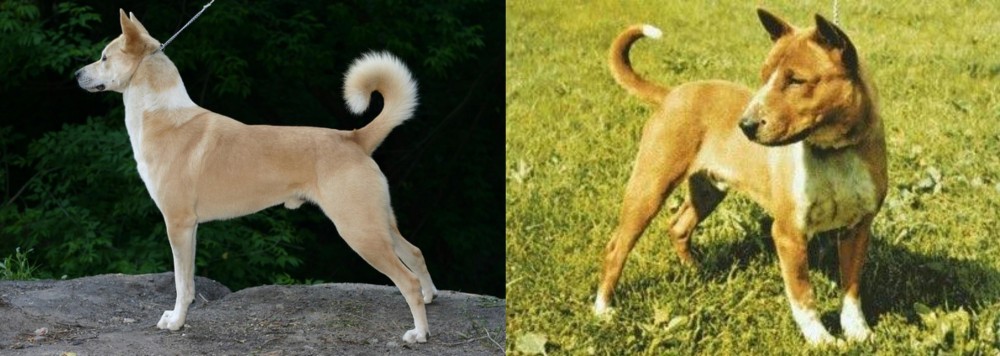 Canaan Dog is originated from Israel but Telomian is originated from Malaysia. Canaan Dog may grow 13 cm / 6 inches higher than Telomian. Canaan Dog may weigh 12 kg / 27 pounds more than Telomian. Both Canaan Dog and Telomian has almost same life span. Both Canaan Dog and Telomian has almost same litter size. Canaan Dog requires Low Maintenance. But Telomian requires Moderate Maintenance
Canaan Dog is originated from Israel but Telomian is originated from Malaysia. Canaan Dog may grow 13 cm / 6 inches higher than Telomian. Canaan Dog may weigh 12 kg / 27 pounds more than Telomian. Both Canaan Dog and Telomian has almost same life span. Both Canaan Dog and Telomian has almost same litter size. Canaan Dog requires Low Maintenance. But Telomian requires Moderate Maintenance
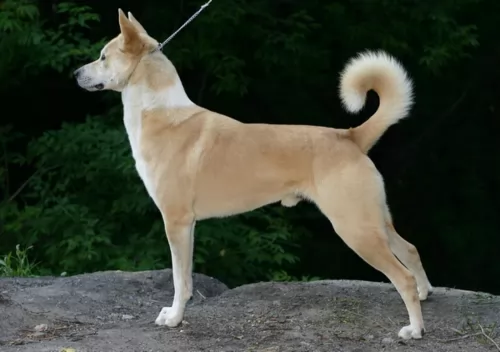 The Canaan Dog is an attractive dog and is Israel’s national breed. Research reveals that the dog’s history can be traced way back to 2200BC.
The Canaan Dog is an attractive dog and is Israel’s national breed. Research reveals that the dog’s history can be traced way back to 2200BC.
The dog’s origins go back to the pariah dog of the Middle East. It is believed that the dog has been perceived as a sacred animal and that he was both guard- and herd dog of the ancient Israelites.
A certain Dr Rudolphina Menzel moved from Vienna to Israel and was asked to establish a service dog organization. She trained and bred them, finding them to be highly trainable. She began a breeding program in 1934, providing working dogs for the military and starting a selective breeding program for the Canaan dog. The Israel Kennel Club dog recognized the Canaan for the first time in 1953.
 The Telomian, out of Malaysia is rare and the only dog bred in Malaysia that lives outside the country. The breed was originally called Village dog or Anjing Kampung in Malay. The Telo is still considered one of the rarest dogs in the world. They are considered as a possible missing link between the Australian Dingo and the African Basenji.
The Telomian, out of Malaysia is rare and the only dog bred in Malaysia that lives outside the country. The breed was originally called Village dog or Anjing Kampung in Malay. The Telo is still considered one of the rarest dogs in the world. They are considered as a possible missing link between the Australian Dingo and the African Basenji.
They were bred to kill vermin by indigenous people, the Orang Asli of Malasia. They have an amazing ability to climb bred into them because these indigenous people lived in stilt houses. Even as they kept the Theomian to hunt vermian, the Orang Asli believed dogs were evil spirits who would eventually turn on them.
In 1963, Dr. Orville Elliot, an anthropologist from the West, discovered the breed and named them the Telomian for the Telom River they lived near. He took a pair to the United States and by 1970 there was a Telomian Dog Club in the U.S. By 1973 another pair had been imported and it is thought that all the Telomians who live in the United States today are descendants of these two pairs.
Like the New Guinea Singing Dog and the Basenji, the Telo do not bark but rather have a unique howl. Being bred from wild dogs, the Telo is not fully domesticate and puppies need a lot of socialization. The Telomian is on the Dog Registry of America Inc and America’s Pet Registry but is not recognized by any pedigree registry.
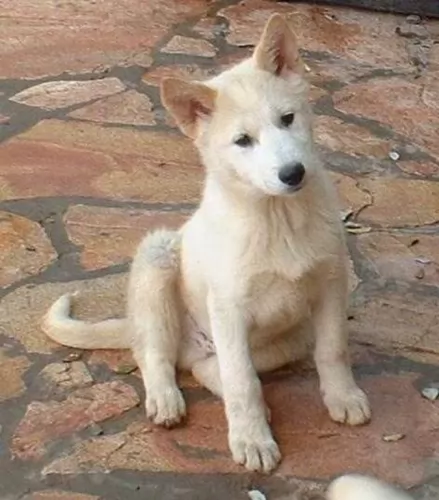 The Canaan Dog is lean, standing at between 51–61cm and weighing roughly 18-25kg. The medium sized Canaan Dog’s coat is medium length and can be sandy to brown, white or black or a mix of these. The eyes are dark and inquisitive, the ears are erect and the high set bushy tail is curled over the back.
The Canaan Dog is lean, standing at between 51–61cm and weighing roughly 18-25kg. The medium sized Canaan Dog’s coat is medium length and can be sandy to brown, white or black or a mix of these. The eyes are dark and inquisitive, the ears are erect and the high set bushy tail is curled over the back.
The Canaan Dog is alert, intelligent, confident and territorial. They are wary of strangers and because they’re alert they’re constantly aware of movement, making them a superb watchdog. However, the dog isn’t aggressive and he makes an excellent family pet, even around children and other pets.
He will need training and socialization though to make him obedient and amicable. He is a strong-willed dog. He is co-operative when being trained and responds well. They are energetic and will make a good companion for runners and cyclists.
 This is a somewhat unique looking breed. They are small dogs, sturdy, athletic dogs with short coat, a square body and a long back. Their coat is smooth and sable and the ticking is white. They often have black masks and purple tongues. They are about 15-18 inches in height and weigh about 18-28 pounds. Their head is well proportioned and they have erect ears, almond shaped eyes and deep chests.
This is a somewhat unique looking breed. They are small dogs, sturdy, athletic dogs with short coat, a square body and a long back. Their coat is smooth and sable and the ticking is white. They often have black masks and purple tongues. They are about 15-18 inches in height and weigh about 18-28 pounds. Their head is well proportioned and they have erect ears, almond shaped eyes and deep chests.
The Telo is still so undomesticated that the female only comes into estrus once a year in September to October. They have great command of their paws and can use them more like cats or racoons. They climb with them and hold toys, objects or food in them. This is related to their need to climb since homes were built on stilts in the jungles of Malaysia.
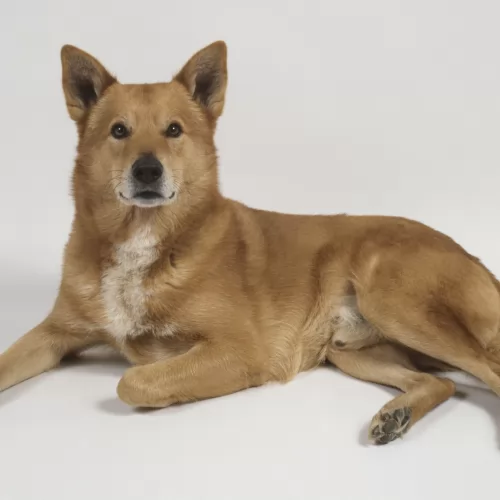 The Canaan Dog is an intelligent dog and this makes him easy to train. He is a strong-willed, independent dog and will require training and socialization to make him obedient. He is an affectionate and loving dog and will make a wonderful family pet.
The Canaan Dog is an intelligent dog and this makes him easy to train. He is a strong-willed, independent dog and will require training and socialization to make him obedient. He is an affectionate and loving dog and will make a wonderful family pet.
The Canaan Dog is also a fairly healthy, robust breed and appeals to many dog owners who don’t have to spend money on professional grooming for him. He doesn’t require much – isn’t high maintenance at all and he is just waiting to become a member of a human family where he can be loved and cared for just like any other family member.
 2.Special talents – climbing ability, use of their paws, able to hunt their own food.
2.Special talents – climbing ability, use of their paws, able to hunt their own food.
3.Adaptability – they are not big so you would think apartment living would be ok but because of their energy and prey drive they really need a place to run.
 The Canaan Dog has a strong immune system and with good care from his owner he can reach 15 years of age. He has been used to living in harsh conditions in the deserts of Israel.
The Canaan Dog has a strong immune system and with good care from his owner he can reach 15 years of age. He has been used to living in harsh conditions in the deserts of Israel.
If you want to buy a Canaan dog, as with any dog, a good breeder will be able to produce health certificates for the puppy's parents. These certificates confirm that the dog has been tested and cleared of certain common conditions that affect dogs.
Because hip dysplasia is such a common problem with dogs, you may want to see health certificates from the Orthopedic Foundation for Animals (OCA).
A form of cancer that you might expect to see in this breed is Lymphosarcoma, a cancer which affects the lymphoid system. The lymphoid system is a critical part of the dog’s immune system to fight off viruses and bacteria.
 This is a somewhat unique looking breed. They are small dogs, sturdy, athletic dogs with short coat, a square body and a long back. Their coat is smooth and sable and the ticking is white. They often have black masks and purple tongues. They are about 15-18 inches in height and weigh about 18-28 pounds. Their head is well proportioned and they have erect ears, almond shaped eyes and deep chests.
This is a somewhat unique looking breed. They are small dogs, sturdy, athletic dogs with short coat, a square body and a long back. Their coat is smooth and sable and the ticking is white. They often have black masks and purple tongues. They are about 15-18 inches in height and weigh about 18-28 pounds. Their head is well proportioned and they have erect ears, almond shaped eyes and deep chests.
The Telo is still so undomesticated that the female only comes into estrus once a year in September to October. They have great command of their paws and can use them more like cats or racoons. They climb with them and hold toys, objects or food in them. This is related to their need to climb since homes were built on stilts in the jungles of Malaysia.
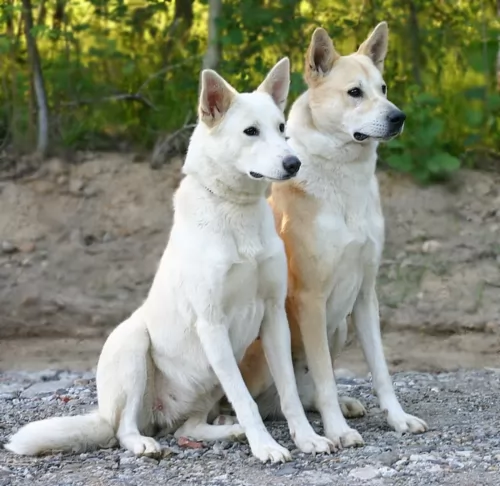 The Canaan Dog needs a steady diet of high-quality food, whether you provide your own home-made food or you buy commercially manufactured food. A healthy diet full of minerals and vitamins is essential for good health. If you’re not sure how to feed your Canaan dog, your veterinarian can advise you according to your dog’s age.
The Canaan Dog needs a steady diet of high-quality food, whether you provide your own home-made food or you buy commercially manufactured food. A healthy diet full of minerals and vitamins is essential for good health. If you’re not sure how to feed your Canaan dog, your veterinarian can advise you according to your dog’s age.
Remember that dogs are carnivorous so even though raw meat can be pretty expensive, you want to include it in his diet from time to time to stave off itchy, dry skin rashes and other illnesses. Always see to it that there is a bowl of fresh, cool water 24/7.
The Canaan Dog is a low maintenance breed who has moderate, seasonal shedding. The coat is easy to groom. He will need a good brush twice a week to keep him free of loose hairs and to keep his coat shiny.
Other kinds of grooming are also important such as brushing his teeth 2 or 3x a week to remove tartar build-up. Bad teeth can affect the immune system and make him ill.
Canaans are going to require a moderate amount of exercise. Just like with any dog, you can’t just buy a cute puppy and when he becomes an adult and no longer cute to you, forget about him in the backyard. A dog is a 15 year responsibility and he will need regular walks and games from you to guarantee his health and happiness.
 This is an isolated, rare breed with very few known genetic health issues. They tend to be very healthy and athletic if well cared for and fed properly. The only issues they are known to have throughout the breed are hip and elbow dysplasia. Both of these issues we know can lead to arthritis and or lameness. Individual dogs may face other challenges such as allergies and obesity, but as a breed they are extremely healthy, much as the dingo and other wild dogs remain healthy.
This is an isolated, rare breed with very few known genetic health issues. They tend to be very healthy and athletic if well cared for and fed properly. The only issues they are known to have throughout the breed are hip and elbow dysplasia. Both of these issues we know can lead to arthritis and or lameness. Individual dogs may face other challenges such as allergies and obesity, but as a breed they are extremely healthy, much as the dingo and other wild dogs remain healthy.
Don’t overfeed them and watch what they might eat or try to eat when outside. They are used to feeding themselves in the wild and the domesticated dogs retain that prey drive and desire to eat what they catch.